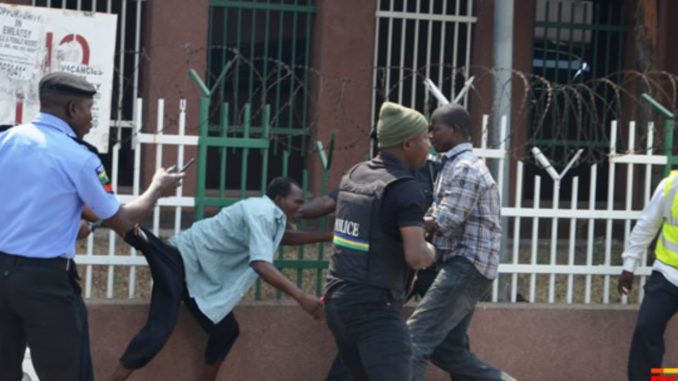
ANOTHER bloody clash between the Nigerian Army and members of the Islamic Movement of Nigeria, otherwise known as Shiites, occurred recently in Abuja during a protest march against the continued detention of their leader, Ibrahim el-Zakzaky, by the Federal Government. There are conflicting accounts of the mayhem. However, the whole saga is condemnable; it is high time the authorities dealt with the root cause of these recurring skirmishes, rather than treating the symptoms.
The Army Headquarters Garrison Commander, James Myam, said that only three of the protesters were shot dead when they allegedly attacked a military convoy. Very striking is the allegation that the Shiites “smashed both military and civilian vehicles’ windscreens and windows; and they also attempted to overrun the escorts, to cart away the ammunition and missiles the troops were escorting.”
But IMN spokesman, Abdullahi Musa, said at least 10 of their members were confirmed dead within two days of the protest that lasted for three days. Forty-seven were eventually killed in the latest violent clash according to Abdullahi Zango, a representative of IMN Academic Forum. Media reports indicate that the protesters blocked the Dutse and Galadima ends of the Kubwa Highway, causing gridlock for many hours. The incident stirs up a sense of déjà vu. They had blocked the highway in Zaria, Kaduna State in 2015; an action that demobilised the convoy of the Chief of Army Staff, Tukur Buratai, and precipitated unimaginable carnage.
Undoubtedly, road blockade is a clear infringement of the right of other road users. Police have arraigned 130 suspects out of the 400 they arrested in connection with the fray, before an Abuja Magistrates’ Court. The Inspector-General of Police, Ibrahim Idris, has vowed to bring to an end the Shiites’ penchant for protests. Interestingly, he justified the use of maximum force as a response to threats to lives and properties posed by the protesters.
In a democracy, however, peaceful protest is an inalienable right of citizens. Therefore, law enforcement agencies should be conscious of this. There is a subsisting Court of Appeal judgement declaring that police demand for a permit before a peaceful assembly can be held is inconsistent with Sections 39 and 40 of the 1999 Constitution. In view of security operatives’ proclivity for mauling and killing unarmed civilians at the slightest provocation or during civil disturbances, which are quelled in other climes without bloodshed, the IG’s justification of the use of maximum force is questionable.
But all parties to the crisis must conduct themselves in a manner that recognises the supremacy of the Constitution. Protesters all over the world are the same: they pelt security agents and smash vehicles as often seen for instance, in the United States and the United Kingdom. In response, security agents repulse them with tear gas, water cannons and rubber bullets; but not with live bullets, which security operatives are accustomed to deploying here. They are only used when the life of a security officer is in grave danger.
This global best practice should be etched in the rules of engagement in Nigeria to end the avoidable bloodshed each time friction occurs between security agencies and hapless civilians. This will help to redeem their abysmal human rights records. It bears repeating that the US government denied Nigeria’s request to sell arms to her in 2014 to fight Boko Haram on account of sundry human rights abuses by the soldiers, which were articulated by Amnesty International.
Nevertheless, President Muhammadu Buhari is to blame for all this. El-Zakzaky has been in detention since 2015 without trial. Several court orders that he be released have not been obeyed. This is provocative and it is why his followers have become splenetic in their agitation. If the Shiite leader committed any offence against the Nigerian State, the normal course of action is to charge him to court. This country is governed by the rule of law and disobeying court orders is not a responsible behaviour. Denying el-Zakzaky access to justice, therefore, is the height of impunity, a descent into fascism that has no place in a democracy.
It is high-handedness such as this that drives fundamentalists underground. The US Council on Foreign Relations sees it that way too; and at the weekend it warned: “Should security service behaviour radicalise the IMN, Abuja would face yet another insurgency for which it is ill-prepared.” In this epoch of conflicts – Boko Haram insurgency, Fulani herdsmen terrorism and kidnapping –another terrorism cluster by default, indeed, will be self-destructive.
But abuse of religion to cause disharmony among Nigerians has become pronounced in the North. This should stop. The IMN members, in exercising their religious freedom of the Arba’een symbolic trek, should learn to do so within the ambit of the law. Putting aside the indefensible el-Zakzaky incarceration, it was the group’s display of lawlessness in the name of religion that triggered the chain of events that resulted in the Zaria massacre in December 2015. A video footage showed them with swords, machetes and sticks blocking the Zaria-Kaduna Highway. Attempts by Buratai’s orderlies to talk to them into clearing the ramparts they created were rebuffed. No government will tolerate these excesses.
However, the President should get the message: the country has had a lot of bloodshed in the last three years. There should not be more.
END

Be the first to comment